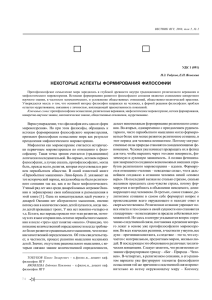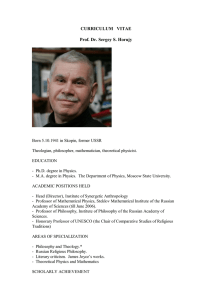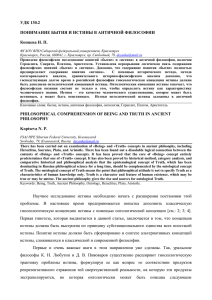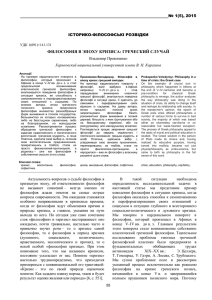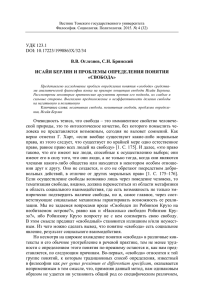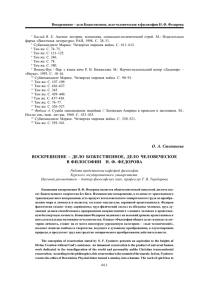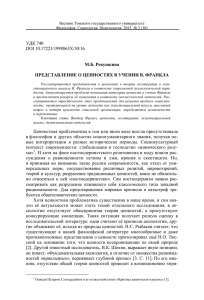Theme 5. God as Being Itself in Paul Tillich`s philosophy and theology.
реклама
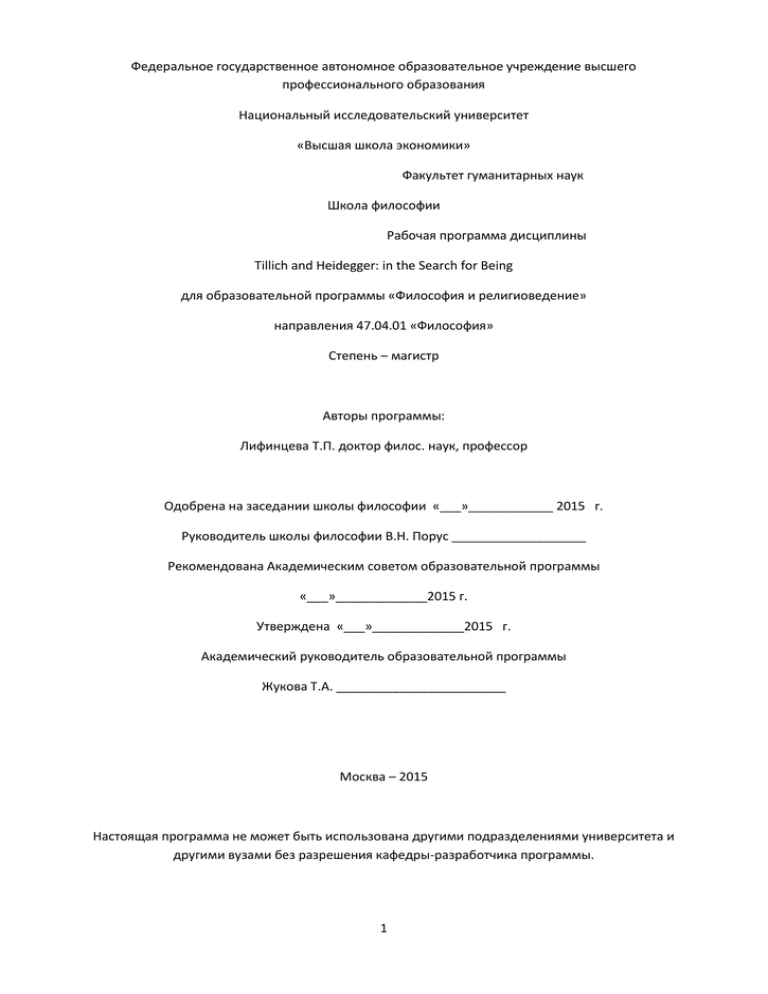
Федеральное государственное автономное образовательное учреждение высшего профессионального образования Национальный исследовательский университет «Высшая школа экономики» Факультет гуманитарных наук Школа философии Рабочая программа дисциплины Tillich and Heidegger: in the Search for Being для образовательной программы «Философия и религиоведение» направления 47.04.01 «Философия» Степень – магистр Авторы программы: Лифинцева Т.П. доктор филос. наук, профессор Одобрена на заседании школы философии «___»____________ 2015 г. Руководитель школы философии В.Н. Порус ___________________ Рекомендована Академическим советом образовательной программы «___»_____________2015 г. Утверждена «___»_____________2015 г. Академический руководитель образовательной программы Жукова Т.А. ________________________ Москва – 2015 Настоящая программа не может быть использована другими подразделениями университета и другими вузами без разрешения кафедры-разработчика программы. 1 “Tillich and Heidegger: in the Search for Being” Abstract The course is devoted to a key theme of philosophy of the first half of the ХХth century – a theme of the "search for Being». It is possible to name the first half of the ХХth century «an epoch of ontology» in philosophy. Basic figure within the course is Paul Johannes Tillich (1886 – 1965) – an outstanding German-American philosopher and theologian, the founder of a school of “neoliberal” theology. The kernel of all concept of Tillich – both philosophy and theology – was a doctrine of Being; a question on Being was the main point of his philosophy and theology. One cannot say that during that epoch he was very original in this aspiration. A list towards gnoceology in the 2nd half of the XIXth and in beginning of the ХХth century (neokantianism, empiriocriticism, pragmatism, phenomenology) has generated a splash of interest towards ontology in 1st half of XXth century - from “Reigns of Being” of J. Santayana to “fundamental ontology” of M. Heidegger and «existential analytics» of J.-P. Sartre. Since the 20th years of the XXth century many philosophers have gone «on the search for Being». The 1st chapter of Sartre’ book «Being and Nothingness» is called «In the Search for Being». Heidegger in the very beginning of his book «Being and Temporality» repeated as a spell: «The Question of the sense of Being should be put forward», «About sense of Being the question should be put forward», «It is necessary to put the question of the sense of Being anew»… 2 And theologians had never lost «the search for Being» as Being for them was God. Tillich, being a philosopher and a theologian, could not stay aside. He aspired to open new ways in ontology, in the spirit of Plato, St. Augustine, Thomas Aquinas, and also Fichte, later Schelling, Hegel and Heidegger. Despite such powerful “engagement” in the philosophical and theological tradition, many researchers and theologians (especially “neoorthodox” Karl Barth) considered Tillich to be a “heretic” and were sure that his doctrine provoked extrareligious interpretations of the Script and the Legend. The problem here, possibly, is in his doctrine of Being, his understanding of God as Being (Being-Itself). This problem is to be discussed in the course. Формы рубежного контроля и структура итоговой оценки: Итоговая оценка по учебной дисциплине складывается из следующих элементов: Посещение лекций. Работа на практических занятиях (доклады, обсуждения текстов ) Письменная аудиторная контрольная работа (30 мин.) Итоговое собеседование. Компетенции: ОНК-1, ОНК-3, ИК-1, ИК-3, СЛК-1, СЛК-2, СЛК-3, СЛК-6 Тематический план учебной дисциплины 3 Всего часов по дисциплине Аудиторные часы Самостоятел ьная работа 1. Existential Philosophy: Religious and Non-theistic 15 Лекции - Семинарск 6 ие занятия -4 5 2. Heidegger’s Being (Dasein) as варианты варианты. the Detection of a Horizon of Authenticity 10 Лекции - Семинарск 4 ие занятия -4 2 № Название темы The Influence of Heidegger on 3. Theological Thought of the XX-th Century Life and Spiritual Searches of 4. Paul Tillich God as Being-Itself in Paul 5. Tillich’s Theology 10 The Problem of Language of 6. Philosophy and Theology: Discussion of Bultmann and Tillich Итого: 11 10 10 Лекции -4 Семинарск ие -4 Лекции - занятия Семинарск 4 ие занятия Лекции - Семинарск -4 4 ие занятия -4 Лекции - Семинарск 4 ие занятия -4 2 2 2 52 Bibliography: 1. Tillich P. Perspectives on 19th and 20th century protestant theology. N.Y.: Harper & Row, 1967. 2. Tillich P. Autobiographical reflections. // The Theology of Paul Tillich. N.Y., 1952. 4 2 3. Tillich P. Open Letter to Emmanuel Hirsch (1934) // The thought of Paul Tillich. San Francisco: Harper & Row, 1985. P. 353-388. 4. Hazel E. Barnes Existentialist Ethics. Chicago: University of Chicago Press, 1976. 5. René Descartes Meditations on First Philosophy. Transl. By J. Vetitch. Oxford University Press, 1952. 6. Martin Heidegger What is metaphysics? // Martin Heidegger, The Pathmarks. Cambridge: Cambridge Univ. Press, 1976. 7. Martin Heidegger Introduction to Metaphysics. New Heaven & London: Yale University Press, 2000. 8. Martin Heidegger Being and Time. Transl. from German by Joan Stambaugh. Albany: State University of New York Press, 2000. 9. Derek K. Heyman Dual and non-dual ontology in Sartre and Mahāyāna Buddhism // Man and World, 30 (1997) pp. 431-443. 10. Steven W. Laycock Nothingness and Emptiness: Exorcising the shadow of God in Sartre // Man and World, 24 (1991) pp. 395-407. 11. Tatyana P. Lifintseva The Buddhist Pill for Sartre’s “Nausea”: Phenomenological and Hindu-Buddhist Treatments of Intentionality // NeuroQuantology Vol. 10, № 4 (2012), pp. 670-680. 12. Tatyana Lifintseva “Sorge” of Heidegger, Sartre’s “l’être pour-soi” and Buddhist “duḥkha”: Ontological Foundations of Negativity. // NeuroQuantology. December 2013. Vol. 11. Issue 4. Page 627-644. 13. Gustav Meyrink The Golem. N. Y.: Dover Publications, 1976. 14. Jean-Paul Sartre The Transcendence of the Ego: An Existential Theory of Consciousness. Transl. F. Williams and R. Kirkpatrick. New York: Noonday Press, 1957 15. Jean-Paul Sartre Being and Nothingness. Transl. from French by Hazel E. Barnes. A New Directions Paperbook, 1970. 16. Jean-Paul Sartre Situations. Oxford University Press, 1980. 17. Baker Encyclopedia of Christian Apologetics. Baker, 1998-2005. 5 18. Brown M. Ultimate Concern: Tillich in Dialogue. New York: Harper & Row, 1985. 19. Collins R. F. Models of theological reflection. Lanham: Univ. Press of America, 1984. 20. Christopherson J. R. The Concept of Nonbeing and its Role in Paul Tillich’s Thought. Chicago: University of Chicago Press, 1995. 21. Cremer D. J. Protestant Theology in Western Germany. // Journal of History of Ideas, Vol. 56, № 2 (April, 1995), p. 289-307. 23. Everitt N. The non-existence of God. L.– N.Y.: Routledge, 2004. 24. Stone J. A. Tillich and Schelling’s Later Philosophy. // Kairos and Logos. Mercer University Press, 1978. 25. Cochrane A.C. Existentialists and God: Being and Being of God in the Thought of Soeren Kierkegaard, Karl Jaspers, Martin Heidegger, Jean-Paul Sartre, Paul Tillich, Etienne Gilson and Karl Barth. Philadelphia: Westminster Press, 1956. 26. Christopherson J. R. The Concept of Nonbeing and its Role in Paul Tillich’s Thought. Chicago: University of Chicago Press, 1995. 27. Everitt N. The non-existence of God. L.– N.Y.: Routledge, 2004. 28. Keefe D. J. Thomism and ontological theology of Paul Tillich. N.Y.: Bookman, 1963. 29. May R. Paulus. New York: Harper & Row, 1989. 30. Tillich H. From Time To Time. N.Y.: Harper & Row, 1970. 31. Collins R. F. Models of theological reflection. Lanham: Univ. Press of America, 1984. 32. Lev V. Filippov Filosofskaya antropologiya Jean-Paula Sartra. Moscow: Nauka, 1977. 33. Diana E. Gasparyan Vvedeniye v neklassicheskuyu filosofiyu. Moscow, ROSPEN, 2011. 34. Evgeny A. Torchinov Puti filosofii Vostoka i Zapada. StPetersburg: Azbuka– Klassika, 2007. 35. Alexey M. Rutkevich Ot Freuda k Heideggeru. Moscow: MGU, 1981. 6 36. Тиллих П. Систематическая теология. Т. 1-3. (Т. 1 – Перевод Лифинцевой Т.П., Т. 2-3 – Перевод Рынкевича В.В., Газизовой О.Р., Зоткиной О.Я.) М.СПб.: Республика, 2000. 37. Тиллих П. Мужество Быть. // Тиллих П. Избранное. Теология культуры. М.: Юристъ, 1995. С. 7-131. 38. Тиллих П. Динамика веры. // Тиллих П. Избранное. Теология культуры. М.: Юристъ, 1995. С. 132-215. 39. Тиллих П. Кайрос. // Тиллих П. Избранное. Теология культуры. М.: Юристъ, 1995. С. 216-235. 40. Тиллих П. Теология культуры. // Тиллих П. Избранное. Теология культуры. М.: Юристъ, 1995. С. 236-395. 41. Тиллих П. Христианство и встреча мировых религий. // Тиллих П. Избранное. Теология культуры. М.: Юристъ, 1995. С. 396-441. 42. Тиллих П. Значение истории религий для теолога-систематика. // Тиллих П. Избранное. Теология культуры. М.: Юристъ, 1995. С. 442-454. 43. Тиллих П. Кьеркегор как экзистенциальный мыслитель. // Тиллих П. Избранное. Теология культуры. М.: Юристъ, 1995. С. 455-460. 44. Тиллих П. Кто я такой? (Автобиографическое эссе). // Вопросы философии, 2002, № 3. 45. Тиллих П. Вечное сейчас.(3 проповеди из сборника). //Вопросы философии, 2005, № 5. 46. Тиллих П. Диалектическая теология (К. Барт) // Путь – сентябрь 1925, № 47. Тиллих П. Потрясение оснований. // Культурология. М., 2007. № 1. С. 90128. 48. Аврелий Августин. Исповедь. М.: Renaissance, 1991. 49. Антология средневековой мысли. В 2 тт. СПб.: РХГИ, 2007. 50. Больнов О.Ф. Философия экзистенциализма. СПб.: Лань, 1999. 51. Бросова Н.З. «Теологические аспекты философии истории М.Хайдеггера». Диссертация на соискание учёной степени Доктора филос. наук. М., 2007. http://sigla.rsl.ru/table.isp 52. Бультман Р. Иисус Христос и мифология. // Бультман Р. Избранное: вера и понимание. М.: РОСПЭН, 2004. 7 53. Бультман Р. Немецкий народ и Израиль. // Бультман Р. Избранное: вера и понимание. М.: РОСПЭН, 2004. 54. Бультман Р. Происхождение и смысл типологии как герменевтического метода. // Бультман Р. Избранное: вера и понимание. М.: РОСПЭН, 2004. 55. Гайденко П. П. Время, длительность, вечность. М.: Прогресс-Традиция, 2006. 56. Гайденко П.П. Прорыв к трансцендентному. М.: Республика, 1997. 57. Громадка Й. Л. Перелом в протестантской теологии. М.: Изд. группа «Прогресс», «Культура», 1992. 58. Зюскинд П. Голубка. СПб.: Азбука- классика, 2006. 59. Кимелев Ю. А. Философский теизм. Типология современных форм. М.: Наука, 1993. 60. Лифинцева Т. П. Философия и теология Пауля Тиллиха.М.: Канон+, 2009. 286 с. 61. Мартин Хайдеггер и теология. Сборник переводов. Институт философии АН СССР. М., 1975. 62. Мартин Хайдеггер; Карл Ясперс. Переписка 1920-1963. М.: Ad Marginem, 2001. 63. Мартин Хайдеггер и теология. Сборник переводов. Институт философии АН СССР. М., 1975. 64. Отто Р. Священное. СПб.: Изд. С.-Петербургского Ун-та, 2008. 65. Сартр Ж.-П. Бытие и ничто. М.: Республика, 2000. 66. Толстой Л.Н. Смерть Ивана Ильича. Собр. Соч. В 12 т., Т. 12. М.: Художественная литература, 1984-85. 67. Хайдеггер М. Бытие и время. М.: Ad Marginem, 1997. 68. Хайдеггер М. Время и бытие. М.: Республика, 1993. 69. Хайдеггер М. Разговор на просёлочной дороге. М.: Высшая школа, 1991. The Contents of Course 8 Theme 1. The existential philosophy: religious and non-theistic. History of existential philosophy, its sources and main representatives. The concepts “existentialism”, “existential philosophy”, “religious” and “non-theistic” existential philosophy, “existential theology”; their correlation and validity. Concepts “existential” and “existentialistic”. The stamps and cliches which have developed in Russian history of philosophy. Литература: 1. Лифинцева Т. П. Философия и теология Пауля Тиллиха. М.: Канон+, 2009. 286 с 2. Гайденко П.П. Прорыв к трансцендентному. М.: Республика, 1997. 3. Больнов О.Ф. Философия экзистенциализма. СПб.: Лань, 1999. 4. Бросова Н.З. «Теологические аспекты философии истории М. Хайдеггера». Диссертация на соискание учёной степени Доктора филос. наук. М., 2007. http://sigla.rsl.ru/table.isp 5. Кьеркегор С. Несчастнейший. М.: ББИ, 2002. 6. Мартин Хайдеггер и теология. Сборник переводов. Институт философии АН СССР. М., 1975. Theme 2. Heidegger’s Being (Dasein) as the detection of a horizon of authenticity of human existence. The departure of philosophy from ontological problematic in the 2 half of the XIX century and return to it in the beginning of the XX-th. Being as Consciousness in its historicity. Time and temporality (Heidegger, Sartre, Bergson). “Being-toDeath” as the detection of authenticity of human existence (the novel of Leo 9 Tolstoy “Death of Ivan Ilyich). The question of Being and possibility of ultimate questioning. Literature: 1. Martin Heidegger What is metaphysics? // Martin Heidegger, The Pathmarks. Cambridge: Cambridge Univ. Press, 1976. 2. Martin Heidegger Introduction to Metaphysics. New Heaven & London: Yale University Press, 2000. 3. Martin Heidegger Being and Time. Transl. from German by Joan Stambaugh. Albany: State University of New York Press, 2000. 4. Jean-Paul Sartre The Transcendence of the Ego: An Existential Theory of Consciousness. Transl. F. Williams and R. Kirkpatrick. New York: Noonday Press, 1957 5. Jean-Paul Sartre Being and Nothingness. Transl. from French by Hazel E. Barnes. A New Directions Paperbook, 1970. 6. Jean-Paul Sartre Situations. Oxford University Press, 1980. 7. Толстой Л.Н. Смерть Ивана Ильича. Собр. Соч. В 12 т., Т. 12. М.: Художественная литература, 1984-85. 8. Tatyana Lifintseva “Sorge” of Heidegger, Sartre’s “l’être pour-soi” and Buddhist “duḥkha”: Ontological Foundations of Negativity. // NeuroQuantology. December 2013. Vol. 11. Issue 4. Page 627-644. 9. Зюскинд П. Голубка. СПб.: Азбука- классика, 2006. 10. Гайденко П. П. Время, длительность, вечность. М.: Прогресс-Традиция, 2006. 11. Гайденко П.П. Прорыв к трансцендентному. М.: Республика, 1997. Theme 3. Heidegger's influence on theological thought of the XX-th century. Explicit position of Heidegger concerning philosophy and theology (the article "Phenomenology and Theology", 1928) and the deep potential of its influence on Protestant and Catholic theology. The contrary positions of perception of Heidegger’s ideas in Protestant theology: sharp rejection (K. Bart, neoorthodoxes) 10 and direct reception (R. Bultmann). Latent reception of ideas of Heidegger by P. Tillich: the doctrine about ontological fear (anxiety) as understanding by person finitude of his life, the concepts "temporarinesses" and "ultimate concern", correlated with “Sorge” of Heidegger. Heidegger’s analytics of Dasein and understanding of God as Being in Christian theology. Literature: 1. Martin Heidegger What is metaphysics? // Martin Heidegger, The Pathmarks. Cambridge: Cambridge Univ. Press, 1976. 2. Martin Heidegger Introduction to Metaphysics. New Heaven & London: Yale University Press, 2000. 3. Martin Heidegger Being and Time. Transl. from German by Joan Stambaugh. Albany: State University of New York Press, 2000. 4. Лифинцева Т. П. Философия и теология Пауля Тиллиха.М.: Канон+, 2009. 286 с. 5. Мартин Хайдеггер; Карл Ясперс. Переписка 1920-1963. М.: Ad Marginem, 2001. 6. Бросова Н.З. «Теологические аспекты философии истории М.Хайдеггера». Диссертация на соискание учёной степени Доктора филос. наук. М., 2007. http://sigla.rsl.ru/table.isp 7. Мартин Хайдеггер и теология. Сборник переводов. Институт философии АН СССР. М., 1975. 8. Гайденко П. П. Время, длительность, вечность. М.: Прогресс-Традиция, 2006. 9. Гайденко П.П. Прорыв к трансцендентному. М.: Республика, 1997. Theme 4. Life and Spiritual Searches of Paul Tillich. The Protestant “liberal” theology and its crisis in the beginning of the XX-th century (A. Ritschl, E. Troeltsch, A. Harnack etc). I World War as the break turn in 11 the Protestant theology. The emergence of neo-orthodox theology (K. Barth, R, Bultmann, E. Brunner, F. Gogarten etc) Theological discussions of the epoche. “Neoloiberal” theology of Paul Tillich as the attempt of synthesis. Philosophical and theological sourсes of Tillich’s doctrine. Literature: 6. Tillich P. The Religious Situation. N.Y.: Meridian, 1956. 1. Лифинцева Т. П. Философия и теология Пауля Тиллиха.М.: Канон+, 2009. 286 с. 2. Тиллих П. Кто я такой? (Автобиографическое эссе. Пер. Лифинцевой Т.П.). // Вопросы философии, 2002, № 3. 3. Тиллих П. Диалектическая теология (К. Барт) // Путь – сентябрь 1925, № 1. 4. May R. Paulus. New York: Harper & Row, 1989. 5. Tillich H. From Time To Time. N.Y.: Harper & Row, 1970. 7. Громадка Й. Л. Перелом в протестантской теологии. М.: Изд. группа «Прогресс», «Культура», 1992. Theme 5. God as Being Itself in Paul Tillich’s philosophy and theology. The tradition of conceiving God as Being in Christian theology: St. Augustine, Boethius, Albertus Magnus, Thomas Aquinas, William of Ockham. The neoplatonic tradition: Christian Mysticism of XIII – XIV c. Revision in the Protestant theology of the XX-th century under the influence of “life philosophy” and existential philosophy of the traditional concept of God as the transcendent foundation of all entities, whose “existence” / “non-existence” should have been 12 logically substantiated. God as Being Itself in Tillich’s doctrine. The influence of ideas of neo-platonism, Christian mysticism ( Влияние на его теологию идей неоплатонизма, мистиков (J.Böhme, Meister Eckhart, Angelus Silesius), and also late Schelling. Literature: 1Cochrane A.C. Existentialists and God: Being and Being of God in the Thought of Soeren Kierkegaard, Karl Jaspers, Martin Heidegger, Jean-Paul Sartre, Paul Tillich, Etienne Gilson and Karl Barth. Philadelphia: Westminster Press, 1956. 2Tillich P. Perspectives on 19th and 20th century protestant theology. N.Y.: Harper & Row, 1967 3Everitt N. The non-existence of God. L.– N.Y.: Routledge, 2000 4Christopherson J. R. The Concept of Nonbeing and its Role in Paul Tillich’s Thought. Chicago: University of Chicago Press, 1995. 5. Cremer D. J. Protestant Theology in Western Germany. // Journal of History of Ideas, Vol. 56, № 2 (April, 1995), p. 289-307. 6. Everitt N. The non-existence of God. L.– N.Y.: Routledge, 2004. 7. Stone J. A. Tillich and Schelling’s Later Philosophy. // Kairos and Logos. Mercer University Press, 1978. 8. Тиллих П. Систематическая теология. Т. 1-3. (Т. 1 – Перевод Лифинцевой Т.П., Т. 2-3 – Перевод Рынкевича В.В., Газизовой О.Р., Зоткиной О.Я.) М.СПб.: Республика, 2000. 9. Лифинцева Т. П. Философия и теология Пауля Тиллиха.М.: Канон+, 2009. 286 с 10. Кимелев Ю. А. Философский теизм. Типология современных форм. М.: Наука, 1993. 11. Гайденко П.П. Прорыв к трансцендентному. М.: Республика, 1997. 12. Антология средневековой мысли. В 2 тт. СПб.: РХГИ, 2007. 13. Отто Р. Священное. СПб.: Изд. С.-Петербургского Ун-та, 2008. 13 Theme 6. The language of philosophy and theology: discussion of Bultmann and Tillich. The question was if philosophy can be the “profane” interpretation of the New Testament doctrine or even (as an extreme version): can philosophy replace by itself theology and religion… The concept of “demythologization” of Christianity in the Protestant theology of the XX-th century. The adepts of “demythologization” (R. Bultmann, Tillich) and the ardent opponents (K. Barth, E. Brunner). The comparison of Bultmann’s and Tillich’s positions. The reception of Heidegger’s ideas by Bultmann and Tillich^ the explicit one (Bultmann) and implicit (Tillich). Литература: 1. Тиллих П. Систематическая теология. Т. 1-3. (Т. 1 – Перевод Лифинцевой Т.П., Т. 2-3 – Перевод Рынкевича В.В., Газизовой О.Р., Зоткиной О.Я.) М.СПб.: Республика, 2000. 2. Тиллих П. Теология культуры. // Тиллих П. Избранное. Теология культуры. М.: Юристъ, 1995. С. 236-395. 3. Бультман Р. Иисус Христос и мифология. // Бультман Р. Избранное: вера и понимание. М.: РОСПЭН, 2004. 4. Бультман Р. Немецкий народ и Израиль. // Бультман Р. Избранное: вера и понимание. М.: РОСПЭН, 2004. 5. Бультман Р. Происхождение и смысл типологии как герменевтического метода. // Бультман Р. Избранное: вера и понимание. М.: РОСПЭН, 2004. 6. Лёзов С. В. История и герменевтика в изучении Нового Завета. М.: Восточная литература, 1996. 7. Лифинцева Т. П. Философия и теология Пауля Тиллиха.М.: Канон+, 2009. 286 с. 8. Collins R. F. Models of theological reflection. Lanham: Univ. Press of America, 1984. 14 The themes of papers and essays 1. The failure of scientific knowledge for conceiving of reality. Primacy of personal over the all-embracing in the existential philosophy. 2. The sources of existential philosophy: the ethical and religious searches of Soren Kierkegaard, phenomenology (E. Husserl), the “philosophy of life” (F. Nietzsche, W. Dilthey, G. Simmel). 3. The non-theistic and religious versions of existential philosophy^ unity and contradictions. 4. Heidegger’s article “Phenomenology and Theology” (1928) and its influence on the Protestant theological thought. 5. Reception of Heidegger’s ideas in Paul Tillich’s creativity. 6. The influence of Heidegger’s philosophy on the Protestant and Catholic thought of the XX-th and XXI-th c. 7. “Philosophy of Identity” of Schelling and Tillich’s existential theology. 8. Paul Tillich and Rudolf Bultmann^ the reception of Heidegger’s ideas. 9. The concept of “demythologization” in Protestant theology of the XX-th century. 10. The departure of philosophy from ontological problematic in the 2 half of the XIX century and return to it in the beginning of the XX-th. Being as Consciousness in its historicity. Questions for the estimation of quality of understanding the discipline. 1. The doctrine of S. Kierkegaard and existential philosophy. 2. “Existential” and “existentialist” philosophy^ the nuances are important. 3. The concept of “existential theology”. 4. Human existence in its historicity as the basic problem of existential philosophy. 15 5. The question of “meaning of Being” in Heidegger’s philosophy. Being and entity. Being and Nothingness. 6. The critic of classical metaphysics in Heidegger’s philosophy. 7. The analytics of Dasien (basic existentials). 8. The interpretation of time and temporality in Heidegger’s philosophy. Human being as a “time-creating” creature. 9. The “genuine” and “ungenuine” existence in Heidegger’s philosophy/ The concept “das man”. 10. “Being-in-itself” and “Being-for-itself” in Sartre’s philosophy. 11. The concept of “Nothingness” and the problem of freedom in Sartre’s existentialism. 12. Conceiving of God as Being in Christian theology. 13.”Theological modernism” of Paul Tillich: tradition and “innovation”. 14. The Christian mysticism as the source of Tillich’s theological system. 15. “Break” in the Protestant theology of the beginning of the XX-th c. : from “liberal” to “neo-orthodox” theology. 16. Conceiving of God as Being-Itself in Paul Tillich’s theology. 17. Tillich’s concept of “ultimate concern” and its correlation with Heidegger’s “Sorge”. 18. “Time” and “Eternity” in Tillich’s philosophy and theology. 19. The finitude of human existence (“being-to-death”) as the detection of a horizon of genuine existence (Tillich and Heidegger). Автор программы: Т.П. Лифинцева, д.ф.н., проф. школы 16 философии факультета гуманитарных наук НИУ-ВШЭ Подпись: 17
